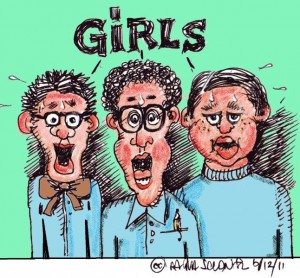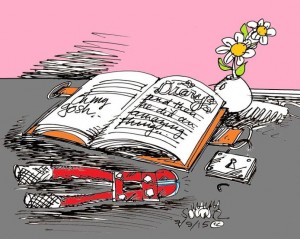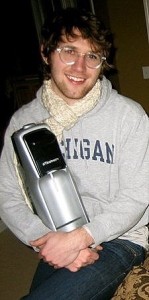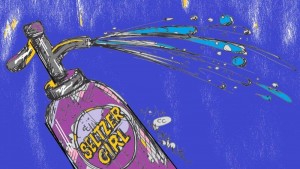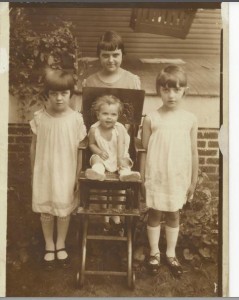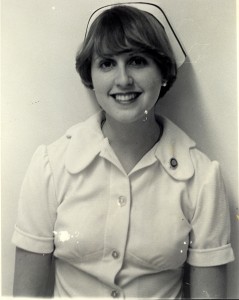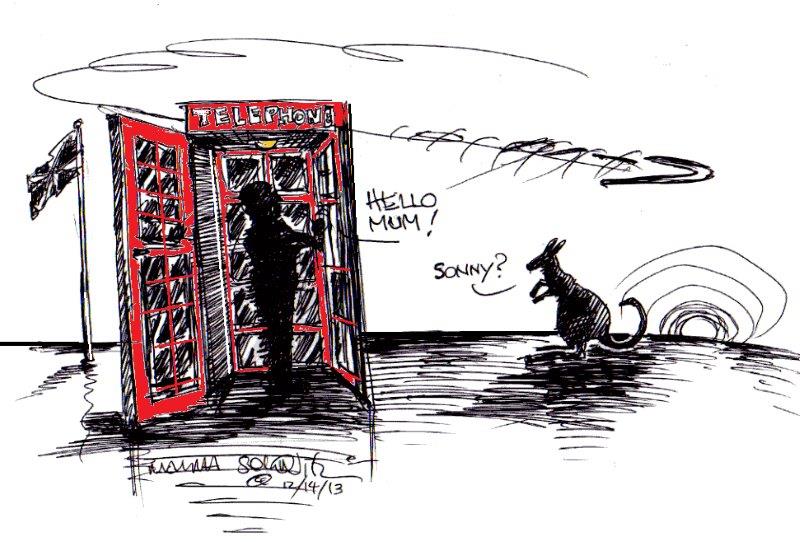Category — Family History, Not Boring
GENEALOGY, UGH
The Western Reserve Historical Society is the Cleveland-version of the Church of Latter-Day Saints, minus the religion angle. The historical society has extensive genealogy records. When I walked out of the society’s library, I ran into a library-goer from Chicago. She said, “We just found out something really interesting about our grandparents.”
Genealogy . . . ugh. Get away from me.
This library encounter was pre-internet days. In the archives, I found out my parents had lived two doors from pianist Chick Chaiken on Kinsman Road in 1930. I didn’t tell the Chicago woman that, and I didn’t tell her that Chick’s brother, Bill, had been a major investor in The Graduate. But she told me some stuff about Chicago, unfortunately.
I like the concept of genealogy — like if your ancestors were pioneers in the Western Reserve, then learn about the Western Reserve, or if your grandparents were Polish Jews, then read Isaac Bashevis Singer. Look at the big picture. I don’t want to hear about how your grandfather — and everybody else’s grandfather — ducked the czar’s army to come to America.
On the other hand, you’re probably interested in my grandfather . . .
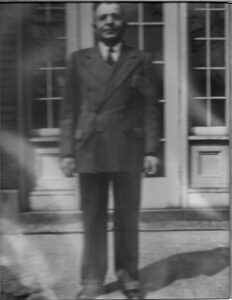
Albert Zalk (1885-1950). Photo probably 1940s.
My mother’s father, Albert Zalk, came over from Europe first-class. He grew up in Eishyshok, near Vilna, Lithuania. He went to Germany to study Torah. In Cleveland he made pomade for blacks during the Depression. He was in Mississippi in the 1920s, residing at first in a rooming house in Duncan, in the Mississippi Delta. Then he started dry-goods stores in Louise and Yazoo City. The Delta: birthplace of the blues. A lot of Jews settled in small towns. My wife’s family comes from Clarksburg, West Virginia. Bob Dylan: Hibbing, Minnesota. All these folks ran “Jew stores” — mom-and-pop hard-goods stores on the main drags.
After Mississippi, Albert returned to Cleveland, mostly fundraising for the Jewish old age home. He, himself, never owned a house.
I’ve donated some Yiddishe Cup memorabilia to the historical society. If you want to know when, and where, Yiddishe Cup’s first gig was, check out the Western Reserve Historical Society, Cleveland Jewish Archives. Or better yet, I’ll tell you here: our first gig was at the Mayfield Road JCC, Cleveland Heights, 1988.
Band genealogy? Don’t get me started.
January 1, 2025 1 Comment
MY MOTHER
I was at the cemetery the other day. I like the place. Someday I’ll be 20 feet from stardom — my mom’s plot. I have a burial plot 20 feet away. I’m a mama’s boy. Julia Zalk Stratton, my mother, died 20 years ago (March 11, 2004).
I never left Cleveland, because of my mom. It’s not that I didn’t try to leave, but I never found a better situation, geographically or psychologically. Some college buddies — hippie-types — wouldn’t even go home for school breaks; they didn’t want to appear middle-class even for a weekend. They would head to Boston or go into the woods. I went home.
When my mother died at 83, her sister told me not to grieve too much. Aunt Celeste said my mother would prefer I act upbeat. Hah.
My mother requested somebody (turned out to be my brother-in-law) read aloud a college essay of mine at her funeral . . .
In memory of my mother, on the 20th anniversary of her death. [This essay was written by a college boy in 1971.]
My mother . . .
She gave me ginger ale when I was sick, and even played catch with me once on the sidewalk. She greeted me all the time with the same happy “Hello, Alberto,” even when she, herself, was sick.
My mother sang in the mothers’ chorus when I was in elementary school, was a room mother with orange drink, and was a den mother. My mother went to see me every time I had a part in the school play, a solo in the schools, or a tennis match, even though I’d often tell her to stay away from the tennis matches. Spectators made me nervous. For big matches, she’d drive me to the courts and come get me when it was all over.
My mother told me to keep my room straight. She told me to be happy. She told me to go to medical school.
My mother came up from the South and found Cleveland to be her real home, with delis and streetcars. My mother was beautiful in her 1940s long black hair. My mother wheeled me in a baby carriage through Cleveland streets when I was one year old before we moved to South Euclid.
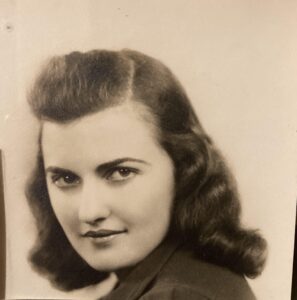
Julia, circa 1941, age 21.
My mother read a book in a second and forgot it the next. My mother baked castle birthday cakes and ship birthday cakes, looking up cake designs in cake books, like she looked up sweater patterns in sweater books. In our front room, she measured my sleeve for a new sweater, knitted in December.
My mother always told me to do my best and have a good time. In second grade she told me to “mind my manners,” and I’d had a lousy time at Doug Cormack’s birthday party, so it was then she switched to “have a good time.”
As I write this, my mother is in South Euclid, and I’m in Ann Arbor, and my sister, Leslie, is in Columbus with her husband and baby. The family is tied together by my mother.
My mother still plays tennis nearly every day. She plays bridge. She goes to Sisterhood meetings. She doesn’t let up for a second. She sweeps the carpet all the time. She’s always picking up — me and everybody else.
March 6, 2024 6 Comments
RINGING HOME
I’m related to very few Strattons. So I got excited when I came across Jon Stratton, the author of Coming Out Jewish. I found him on the internet. Wow, another Stratton writing about Jewish matters. Maybe I’m Jon, using a pseudonym.
Jon Stratton is a cultural studies professor in Perth, Australia. His mother was Jewish and his father Christian. Jon grew up in England, not knowing anything about Judaism or Yiddishkayt (Jewishness).
I ordered Jon’s book on Amazon. I found out Jon “came out Jewish” in multicultural academic circles, writing about, among other things, “ghetto-thinking” — Jewish anxiety. He said he had been slightly different from his friends in England because his mother had made him “ring home” whenever he went out, while his chums never had to ring home. Jon’s mother was an angst-ridden Jew from the Continent.
My mother, on the other hand, was from the Mississippi Delta and didn’t worry about anything. My mother left me off at freeway exits to hitchhike. One trip I made a left on I-80 and wound up in South America. She was OK with that.
In 1990, at the Cleveland airport, I waited for my mom to arrive on the “snowbird” flight from Florida. I was with my then 9-year-old son, Teddy, who I let run around the airport. But I warned him, “If you wander off too far, you’re going home on the Rapid.”
He wandered off and I left him. A half hour later a Cleveland policeman called me, and I had to go back to the airport — 20 miles one-way. The airport cop gave me a “sir, you are a douche bag” smirk when I entered the airport police office. The cop didn’t understand my son had practically memorized the Rapid Transit timetable and had ridden the complete Lee Road route.
I learned laissez-faire childrearing from my mother. There was nothing continental about her except her airlines. (Cleveland to West Palm Beach direct on Continental.)
If I ever go to Australia, I’ll look up Jon Stratton and maybe we can talk about our mothers.
October 12, 2022 1 Comment
LEGAL TENDER
I never subjected my future-wife to a Diner-style quiz. I never said, “Who is Unitas or I won’t marry you.” But if I had asked important dating questions, I would have asked about money. Who is on the dime? I have a negative opinion of people who don’t know who is on the dime.
Who is on the $10,000 bill? That, I won’t hold against you. The government hasn’t printed a 10K bill since 1946. [Answer: Salmon P. Chase. Sir, your first name is a fish!]
My favorite coin is the Kennedy half-dollar because it has heft and has a good feel to it (serrated edges), and it’s half a rock — a quality nickname. I haven’t seen one in years. The government stopped making Kennedy half-dollars in 2003. You can go to a bank and request a half a rock, but who’s going to do that? I sold most of my half-dollars for their silver content decades ago, during the Hunt brothers silver boom.
I did give my wife a low-stakes money quiz. Way too late — we were already married many years. Alice knew Lincoln is on the penny and Washington is on the dollar bill. She said an Indian is on the nickel. That’s a very old nickel, Alice. I didn’t say anything. I didn’t want her to have a negative opinion of me.
July 7, 2021 1 Comment
SHOPPING WITH MOM
My mother, Julia, wanted herring and a third of a pound of pastrami, sliced thin. I went to Heinen’s supermarket and got it for her, and she died the next day.
I regularly shopped for my mom while she was in assisted living. She didn’t want to exist solely on the kosher food at the Jewish facility. (That’s a common complaint of the non-Orthodox.)
Occasionally my mother came with me to Heinen’s. She got the motorized Dodgem cart. She wasn’t a great driver. She had Parkinson’s.
She schmoozed with the clerks and checked expiration dates on cole slaw. She always taught me something; in the cereal aisle, she once told me, “You get the most weight for your money with shredded wheat.”
She liked Pepperidge Farm Milano cookies and Pringles potato chips. She could eat anything. I had to buy her Boost to gain weight.
I liked the snack aisle at Heinen’s, and I liked having an excuse to go there. What kind of Milanos should I get? There were seven varieties. What kinds of Pringles? There were 15 choices. I was shopping for junk for health reasons.
She once wanted me to ask for “Jewish tongue” at the deli counter, because she couldn’t attract the clerk’s attention; she was seated too low in her motorized cart.
I said, “Jewish tongue, please!” That’s the only time I ever said that.
My mother had served tongue when we were growing up. It was bad then, and it’s bad now.
Toward the end, nothing tasted good to my mom. Everything was too spicy, or not spicy enough. The only thing that worked was shrimp cocktail. She had no taste buds left. That was about her only complaint in her last years. My mother wasn’t a kvetch.
I continued going to Heinen’s after she died in 2004. But I don’t go into the center aisles often where the junk food is; I hang around the “healthy choice” perimeter.
My visits to Heinen’s are like mini-yahrzeits for my mother. Pringles: Mom. Pepperidge Farm Milanos: Mom. Jewish tongue: Mom. That last one, I still have trouble with.
—
The above essay appeared in the New York Times 10 years ago. I sent it to “oped@nytimes.com” with the subject line “here’s one for mother’s day.”
—
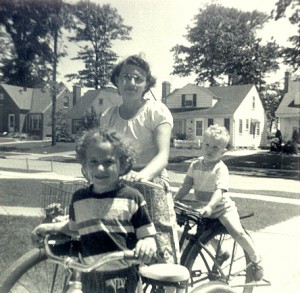
Julia Stratton (1920 – 2004). 1953 photo. Leslie (front) and Bert.
May 5, 2021 6 Comments
I’M NOT KENNETH
I’m not Kenneth. I was supposed to be Kenneth, but my mother’s father, Albert Zalk, died four days before I was born. So I got “Albert.”
My grandfather died unexpectedly of a heart attack on a Saturday night (July 9, 1950); was buried the next Monday; and I was born three days later. Over the years I asked my mother how she made it through that week in July 1950. She always brushed me off with “I’m wasn’t even thinking.”

Albert Zalk. Cleveland, 1940s.
Here’s a parallel between my grandfather and me: Albert Zalk spent the last 18 years of his life collecting money for the Jewish Orthodox Old Home, and I’ve spent the last 20 years playing music at Menorah Park, the successor to the Jewish Orthodox Old Home. My grandfather wasn’t a big-time fundraiser for the home. He was not a macher. He was an edel (gentle) man and part-time Hebrew teacher. He lived in an apartment on East 140 Street and had little savings. His three daughters slept in one bedroom. Maybe he was a schnorer — a derogatory term for a tzedakah collector. I bought a membership to the Plain Dealer archives the other day and read Albert Zalk’s obit: “[Albert Zalk] known to thousands of persons in the Cleveland Jewish community for his activities in behalf of the Jewish Orthodox Old Home . . . was a familiar figure in all parts of the community.” So Albert took care of business, and for a good cause, besides.
Albert Zalk arrived in New York from Eishyshok, Lithuania, on the President Lincoln, via Hamburg, in 1909 at the age of 24. He made his way to the Mississippi Delta. His older sister was already there, married to a former-peddler merchant. Albert eventually owned two dry-goods stores, in Yazoo City and Louise, Mississippi. Albert had financial success. My mom said her childhood house in Yazoo City had a maid, cook and “yard boy.”
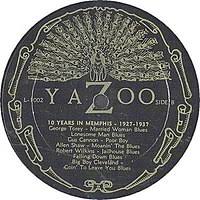
My mother bought me a harmonica for my bar mitzvah. A chromatic harp — not a blues harp — but still, give her credit. I played harmonica a lot on the Diag at the U. of Michigan. Yazoo Records was a blues-reissue label that started in the 1960s. I liked the company logo.

Julia Zalk Stratton, 1953, with her kids, Leslie (front) and Bert (rear). South Euclid, Ohio
The Depression walloped my grandfather’s Mississippi stores, and he moved to Cleveland in 1930. Also, he wanted his three daughters to find Jewish boys to marry, and there weren’t many in Mississippi. Two years after arriving in Cleveland, Albert was traveling through Cleveland Jewish neighborhoods collecting money for the old folks home.
A relevant relative: Ann Sklar of Mississippi. She never married and lavished extra attention on her extended family. My mom said Annie didn’t marry her longtime sweetheart because he wasn’t Jewish, and she didn’t want to hurt her parents. Annie graduated from Mississippi State College for Women (The “W”). That was a somewhat unusual thing — a female college grad back then. (My mom was accepted to Flora Stone Mather, the women’s college at Western Reserve, but didn’t go because she couldn’t afford it. She saved her acceptance letter and attended secretarial school.) Ann Sklar became a secretary and office manager at W. P. Brown farm (Drew, Mississippi) — the largest individually owned cotton plantation in the South. When I was born, Annie sent me an engraved kiddush cup, along with her handwritten card that began “Dear Little Albert . . .”
On Monday I’m playing at Menorah Park for the first time in four months, because of Covid. Outdoors. Little Albert on the bandstand. (For the record, I’m 5-8, and have been avoiding “Albert” for most of my life.)
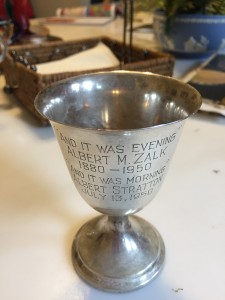
The engraving on this kiddush cup reads “And it was evening, Albert M. Zalk, 1880-1950. And it was morning, Albert Stratton, July 13, 1950.” [1880 is wrong. Should read 1885.]
July 15, 2020 6 Comments
YOU ARE A COMPLETE FAILURE
What happened to Sylvia Rimm? She used to be on public radio, dispensing childrearing advice. Rimm told my wife and me to subsume our individual personalities and create a united front to raise our kids. We didn’t. My wife, Alice, quoted Sylvia Rimm endlessly. Alice also quoted Eleanor Weisberger, Spock, Braselton and every other childrearing guru.
Alice wanted our kids to acquire a “sense of mastery” — of everything. Like going to Disney World was garbage, according to Alice, because our kids wouldn’t learn anything there. Actually, the kids learned a lot there. Teddy single-handedly planned the whole Disney World itinerary.
Our kids had so many lessons. I mean, ping pong lessons, tumbling lessons, Hebrew lessons, accordion lessons . . . Capoeira. What’s that?
My wife now gives lessons in everything.
Our youngest kid, Jack, learned to juggle by age 10. Our daughter, Lucy, became a Division 3 college athlete in diving. We didn’t allow much TV, except Mr. Rogers and once in a while The Simpsons. When our kids grew up, they immediately got TVs and watched every show made in the past 40 years.
I liked Bettelheim’s A Good Enough Parent. I liked the title. I swore at my kids. Was that so horrible? Probably hit my kids. Blocking it. One of my teenage kids took my car to an SAT test, and I needed the car for a gig because my music gear was in the trunk. I went to the SAT site and swore at the kid. An adult said to me, “Hey, ease up.” My outburst cost my child at least 30 points.
I snitched on some delinquent neighborhood kids who were very loud and rowdy. I called the police. The cop said, “Hey buddy, you’ve got a pretty short fuse.”
Are you perfect? Are you “slightly imperfect,” like my underwear? Are you good enough? Or are you a complete failure?
February 12, 2020 1 Comment
CAN YOU TOP MY MUSICAL LINEAGE?
I look for my musical roots wherever I can. My grandmother played piano at a Baptist church in Yazoo City, Mississippi. Not bad. Not good, either: 1) it was a white church and 2) she was reading sheet music. My Mississippi bubbe, Ida Kassoff Zalk, had a brother, Earl Kassoff, in Cleveland. Earl was a drummer, xylophonist and house painter. He led bands in Cleveland under the name Earl Castle.
Because I’m a musician, people sometimes ask me, “Did your parents play? Is your family musical?” Not particularly. That’s why I looked so hard for lineage. I couldn’t find much info on Earl. I talked to a couple relatives. Earl didn’t leave behind sheet music or tune books. He died in 1969. At a gig, an elderly musician/guest and I schmoozed, and I asked him if he remembered Earl Kassoff. The schmoozer was Harold Finger, age 77. He, himself, had played clarinet and sax professionally during the 1930s and 1940s.
I went to Harold’s apartment in Lyndhurst and interviewed him in 1992. He said there had been “four or five bands that got the Jewish work back then.” I asked him what bands. He didn’t remember any names. “What were the most popular Jewish tunes?” I asked. He said, “The Kammen book. That was the big thing.” The Kammen book was the Kammen International Dance Folio, published in 1924, and it is still around. The book is for musicians who don’t know many Jewish songs and have been asked by clients, “Can’t you play something besides ‘Hava Nagila’?”
Uncle Earl’s band did mostly “dance work” — American music, Harold said. Earl had worked the downtown theaters, as well as the Golden Pheasant — a Chinese restaurant where Artie Shaw started out. Harold said he, himself, didn’t stick to the melody all the time. He did some “faking” (improvising). Now he played clarinet in a community orchestra. “I don’t do much jobbing anymore,” he said. Jobbing was gigging.
Harold died three years after the interview. Harold’s wife was on the interview tape, teasing Harold about how he loved his saxophone and clarinet more than her. Harold said, “I quit playing music for you!”
Recap: I come from a piano-playing grandma in Mississippi and a house-painting xylophonist great uncle in South Euclid, Ohio.
—
Here’s something I wrote for City Journal: Latke Blues.
January 8, 2020 2 Comments
THINK YIDDISH, ACT BRITISH
Bill Miller, who went to law school in South Dakota, wore a cowboy hat to our sons’ Little League games. Jews — the subject — came up, as it tends to around me. Bill ended our conversation with, “Think Yiddish, act British.” This was a new expression to my ears. Also, this guy — Bill Miller — was Jewish? Bill said he was inching his way back to the East Coast. He had lived in South Dakota, Iowa, and now Ohio. He had grown up on Long Island.
Bill got me to thinking about my personal “Think Yiddish, Act British” (TYAB) playbook. I had learned the cardinal rule of TYAB, courtesy of my mom: “Don’t make a scene.” If anybody in my family ever said “Jewish” in a restaurant, for instance, my mother would glance around to see if anybody heard. Forget Jew — the word — I rarely heard that growing up.
My dad couldn’t read (sound out) Hebrew. My mother could. My father’s parents were “basically communists,” an elderly cousin told me. That was a bit of an exaggeration. My grandparents were entrepreneurs with a socialist background. Par for the course.
We put out Easter eggs and got Christmas presents. No tree. No yelling. At High Holidays, my mom would write my teachers: “Please excuse Bert’s absence from school due to religious observances.” My temple held services on Sunday, not Saturday.
Jewish got more play beginning in 1967. I was surprised when my parents attended an emergency fundraiser for Israel. A lot of American Jews stepped forward during the Six-Day War. Abba Eban, at the U.N., was my hero. The possibility of a second Holocaust seemed very real. A couple kids in my high school began wearing Jewish Power buttons, courtesy of a button shop in Greenwich Village. I didn’t have the guts to wear the button. The button-wearing kids had grown up in the Jewish neighborhood, not with the Italians like I had. After the Israeli victory in 1967, the TYAB playbook became nearly obsolete.
At my dad’s funeral in 1986, my father’s brother Milt baited the officiating rabbi: “One place I’d never go is Israel.”
“Why is that?” the rabbi asked.
“Our mother was an ardent Zionist who wanted us to move there, and I didn’t want to.”
My mother questioned Milt’s propriety several hours later. According to my mom, 1) Uncle Milt’s mother had been a Zionist, but had never urged her kids to make aliyah. 2) Milt was a jackass for making a scene.
An etiolated version of TYAB was alive. But is TYAB in effect when you’re totally among Jews?
—
Yidd Cup/ Funk A Deli plays a concert 7 pm Thurs, Aug. 15, at Walter Stinson Community Park. That’s somewhere in University Heights, Ohio. (hint: 2313Fenwick Rd.) Free. Outdoors.
August 7, 2019 2 Comments
THE TAXMAN COMETH
Every January I spend a day filling out employer tax forms. My favorite is the Federal Unemployment Tax Act (FUTA) form. I did my first FUTA Form 940 in 1978, when my dad started going to Florida for the winter. He and his high school buddies golfed in Boca Raton, and I filled out FUTAs in Cleveland.
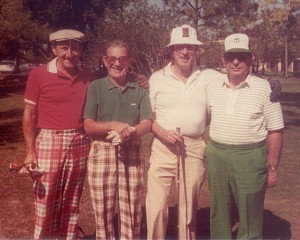
Toby Stratton (far L) w/ friends at Boca Lago CC, 1983
The treasurer of Ohio likes his W-2 reconciliations promptly. The state unemployment bureau also likes its money quickly. And don’t forget workers comp.
I used an IBM Selectric-style typewriter for tax forms until the machine died around 2011. The A key wouldn’t work. That was its main drawback. “ lbert Str tton” didn’t cut it with the government. I threw out the typewriter and several boxes of Ko-Rec-Type. I spent a few hours behind this typer:
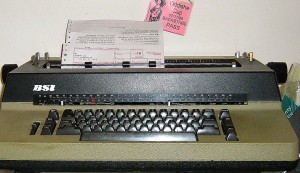
It’s an IBM knock-off, actually.
Now I use IRS computer forms, except for my Yiddishe Cup 1099s, which I do by hand. I used black ink on Yiddishe Cup’s 1099s. One year I used blue, which is ill-advised. The gobierno prefers black ink. I got with the program.
What are you in jail for?
Blue ink.
No thanks.
January 2, 2019 1 Comment
TRUCKIN’
My cousin Marc had a GMC tractor-trailer, which he parked in the May Co. lot in University Heights. Marc was possibly the only Jewish long-distance trucker in the Heights in the 1970s. In 1975 Marc borrowed a few thousand dollars from my father for the truck. Marc had a contract with International Truck of Rock, Minnesota. Ultimately, Marc moved to Pennsylvania and never repaid my dad.
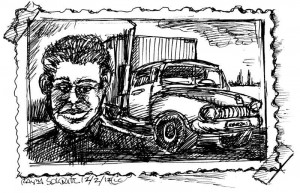
In high school Marc had been a J.D., stealing hubcaps. Hubcaps from Shaker Heights. Class. When Marc’s mother (my dad’s sister) heard Marc hadn’t repaid my dad, she made payments, but never fully repaid the loan. My father’s attitude was “win some, lose some” with family.
April 4, 2018 3 Comments
MAJOR ROOFER
I like roofs more than most people. I married a roofer’s daughter. My father-in-law, Cecil Shustick, had a roofing company in Columbus, Ohio. He was an orthodontist before being a roofer. (Look it up. It’s true.) He was an orthodontist in the early 1950s. His father owned a roofing company. Cecil had a wartime neck injury, so he didn’t relish standing all day at a dental chair, so he became a roofer. Also, orthodontia wasn’t, as yet, a big moneymaker in central Ohio in the fifties. Cecil did mostly estimating. He ran a 27-man, 9-truck company.
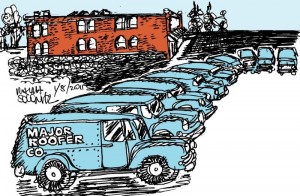 Gutters are interesting: copper, galvanized (the worst) and coated. Cecil didn’t offer me the biz. He should have, my father always said. My dad swore Cecil should have at least given me the opportunity to say no.
Gutters are interesting: copper, galvanized (the worst) and coated. Cecil didn’t offer me the biz. He should have, my father always said. My dad swore Cecil should have at least given me the opportunity to say no.
Dad, I ain’t moving to Cow-lumbus to run a roofing company!
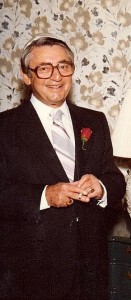
Cecil Shustick (w/ ciggy), 69. (1978)
When Cecil retired, he sold the business to Don The Goy, who ran the biz into the ground. Cecil lost a lot of money on that, and so did I, indirectly.
If I had taken over the business, I probably would now be in a nice house in Bexley, Ohio, with a stack of workers’ comp claims in front of me. (A lot of roofers are overweight drinkers with back problems.) That wouldn’t be much different than the way I did wind up!
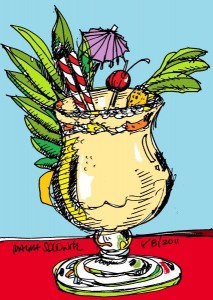 Cecil was a bon vivant, who kept a quart of piña colada by his bed for dry throat, due to antihistamine overuse, he claimed. He liked top-shelf goods: Chrysler Imperials and Chivas Regal. And he didn’t like sweating. Cecil said, “If man was meant for jogging, he’d have hooves.” Golf was his game.
Cecil was a bon vivant, who kept a quart of piña colada by his bed for dry throat, due to antihistamine overuse, he claimed. He liked top-shelf goods: Chrysler Imperials and Chivas Regal. And he didn’t like sweating. Cecil said, “If man was meant for jogging, he’d have hooves.” Golf was his game.
***
I didn’t know the early Cecil. I knew the retired Cecil — the guy in the velour warm-up suit with the Marlboros.
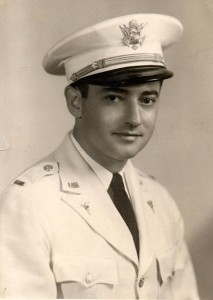
Cecil Shustick, U.S. Army Dental Corps, circa 1942
Don Whitehead, an A.P. correspondent, filed a dispatch, Dec. 3, 1943, with the Fifth Army south of Rome:
In one large, roomy cave Capt. Cecil Shustick, Columbus, Ohio, and Lt. Samuel Clarkson, Lebanon, Ky., set up a medical detachment station. On the little ledge, a charcoal fire was burning to take the damp chill from the air . . .
The Italians had used the caves as storage places for vegetables, fruit and grain. When the Americans came along, they moved into them and used them as command posts, medical stations and billets.
This is a valley of hell – a man-made hell of thunder and lightning . . . The guns never cease their striking. Whole batteries of them roar in unison with a concussion that shakes the earth.
Cecil Shustick came home a major with a Bronze Star. He fought at the Battle of Monte Cassino, Italy. Cecil kept things light and bright. You’d never know about Italy.
—
A version of this first appeared 1/12/11. This one is for the 75th anniversary of Pearl Harbor Day.
December 7, 2016 4 Comments
STONE GARDENS, SUITE 105
My mother lived in suite 105 at Stone Gardens Assisted Living. My cousin George’s mother, Natalie Becker, moved in right after my mother died in 2004. Natalie lived there until January 2013.
In March 2013 I had a gig at Stone Gardens; I called up an elderly relative, Shony Long, to invite her to the gig. She was my mom’s cousin and had recently moved to Stone Gardens.
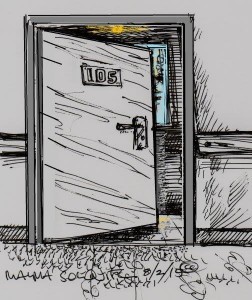 Shony said, “I know you’re playing. I read it in the Stone Gardens bulletin.”
Shony said, “I know you’re playing. I read it in the Stone Gardens bulletin.”
“You don’t live in 105, do you?”
“Yes.”
“You do?”
What — did 105 have my name on it? I remember I told the ambulance driver in 2004, “Can I just have a few minutes with my mom.” The driver said no problem. My mom was dead.
I said to Shony, “I don’t want to go into your apartment.”
“So you’re going to be that way?” she said.
Shony died in May. I wonder who’s in suite 105 now.
—
Last chance to pre-order Vulfpeck’s album Thrill of the Arts, which comes out Friday. Buy here and get a download, T-shirt, LP and Reuben sandwich. (Vulfpeck is Jack Stratton’s band.)
October 7, 2015 2 Comments
OVATION OF CALIFORNIA
My dad had a cosmetics franchise similar to Mary Kay. It was Ovation of California. My mother went to Los Angeles to learn more about it, and when she returned, she dumped a box of cosmetics onto the dining room table. My sister got the cosmetics, and I got a shoehorn from the Beverly Hills Hilton Hotel.
My sister held up her diary. “Look what your darling son did to my diary while you were gone,” she said. I had cut the lock off her diary. Big deal.
“I apologized,” I said. (I was researching petting — as Ann Landers called making out. I was 13, my sister was 16. I thought she had some info.)
My mother said, “So you tore open your sister’s diary?”
“I’m sorry.” I bought my sister a new diary.
One more crime: my father put a bottle of Ovation cleansing cream in the bathroom and made me use it. I was supposed to rub the cleanser on my forehead with a cotton ball. “This is no gimmick,” he said. “Men use it.” My dad tried to turn me into a metrosexual! The franchise went under in a year.
—
Yiddishe Cup plays 6:30 pm Sun. (July 12) in Granville, Ohio (near Columbus). More info here.
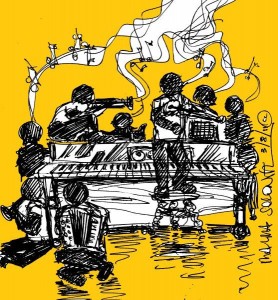
July 8, 2015 7 Comments
SELTZER GIRL /
MISSISSIPPI ALBERT
Seltzer is a major player in my house. My wife, Alice, bought stock in seltzer, SodaStream, and I drink a fair amount of La Croix and occasionally Klarbrunn from Costco. I stick to lime and lemon. I should try peach. I was at a party — on a gig — where the host had all the La Croix flavors, but I wasn’t thirsty so I didn’t open up the various cans and sip.
There used to be seltzer delivery guys. I never saw one. My friend Shelly had home delivery. My parents didn’t. My mother was big with Diet Rite Cola, though. My son Teddy favored Hank’s Root Beer. Alice used to be a diehard Diet Coke proponent. My son Jack loves SodaStream. My daughter, Lucy, doesn’t drink much. That’s the story of carbonation in my family.
Alice gives SodaStreams as gifts. She hopes her purchases will increase the stock’s value.
I know people who can distinguish club soda from seltzer water, and can expound on the level of fizz in SodaStream versus canned seltzers. My wife is one of those persons. She is Seltzer Girl.
—
Check out “Mississippi Albert” in Belt Magazine. It’s about my “roots” in Mississippi. When I taught blues harmonica, I told the students my mother was from Yazoo City, Mississippi. I wasn’t lying! Here is the story. I traveled to Mississippi. This photo, below, is from Cleveland Heights, 1977:
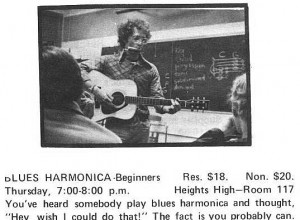
—
One more photo . . . from Mississipppi, about 1926. My mother, Julia Zalk Stratton, age 6, on R; her older sister, Bernice Zalk Golden, in back; and baby sister Celeste Zalk Kent (who is now 87) in the high chair; and a cousin on far L:
November 12, 2014 8 Comments
ADDRESS YOUR MESS
My mother, Julia, never saved anything. When she moved to assisted living, the only thing she kept was her dining room set and some clay pots my dad had made.
My dad was an amateur potter in his retirement. He didn’t use a wheel; he pinched the clay with his thumbs. His work wasn’t too good; I threw most of his stuff in the garbage. My mother watched and said, “How could you!”
“Mom,” I said, “I’m saving some of it– some representative pieces!”
Address Your Mess.
Address Your Mess is a woman in Cleveland who, for a fee, de-clutters your house. My mother didn’t need her.
Maybe I need AYM. I have report cards from elementary school in my attic. My mother said I could be president someday, so I’m holding on to the report cards.
Is my mess more important than your mess?
I gave the Address Your Mess phone number to a high school friend whose parents moved out of their bungalow after 50-plus years. They had stuff.
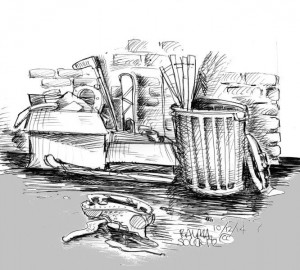
I read about an elderly woman in southeast Ohio who had 36 boxes of cereal, GAR medals and a wooden fife from the battle of Chickamauga.
I have UN stamps too, besides the report cards.
—
Here’s a vid, “Square Mile,” about real estate and board games:
https://www.youtube.com/watch?v=qYnabJr7esc
—
Yiddishe Cup is at Fairmount Temple, Beachwood, Ohio, tonight (Wed.) and Park Synagogue, Cleveland Hts., tomorrow night.
October 15, 2014 6 Comments
LOVE AND RENT
I lived in a Cleveland Heights duplex — a side-by-side. Joe, the landlord, lived in the other half. He wore a sleeveless T-shirt, smoked cigars and nagged his wife.
A note taped to the thermostat — on my side of the house — read: “Whoever is turning the thermostat up and not turning it down, is throwing money out the window!” I lived with a social worker, a Case Western Reserve nursing student from a strawberry farm in Lake County, and a telemarketer. I met these guys off a bulletin board at Case.
I practiced guitar in the basement, trying to be Bob Dylan.
When the social worker moved out, a woman came by to look for a room to rent. I met her at the house’s front door and said, “We’re looking for somebody clean, quiet, and . . .”
“Cute?” she said. She was wearing taped glasses. Nevertheless, she was not bad looking.
The strawberry farmer said to me, “You think she’s Jewish?” (He was always looking out for me.)
“She’s a nurse from West 45th Street,” I said. “Not likely.”
The woman rented the room. Then the landlord’s wife, Gertie, kicked her out. Gertie said, “Girls spell trouble. I’d rather deal with men. You should take that as a compliment, fellas. Why would a girl who makes a good living want to live here anyway?”
Joe, the landlord, chimed in, “We have to be indiscreet about this. What if you all start bringing in girls? It’ll look like a whorehouse. You’ve always been gentlemen till now.”
I went down the basement to practice. I was making $9/hour teaching blues harmonica at the adult-ed program. Not bad for 1977.
The nurse moved out, to her own place, a nearby double, and I called her and we went out. We hit it off. I told my parents, “She’s from West 45th Street.”
My father said, “Are her parents devout Catholics?”
“She’s Jewish.” (She was. I wasn’t pulling my dad’s leg, for a change.)
My mother said, “I’m getting a new dress now. Get married. You can get divorced later. You promised you’d get married when you’re 27 and you’re 27. A Jewish girl in nursing?”
“Because she wants to marry a doctor,” my father said. “Anything wrong with her? She’s a 26-year-old unmarried Jewish girl.”
“Girls are more independent nowadays,” my mother said.
The girl and I got married the next year.
—
Footnote: Alice lived on West 45th Street because it was somewhat near Tri-C West nursing school, and the rent was cheap.
July 23, 2014 6 Comments
RINGING HOME
I’m related to few Strattons. So I got a bit excited when I came across Jon Stratton, author of Coming Out Jewish. I found him on the Internet. Another Stratton writing about Jewish matters? Maybe I was Jon, using a pseudonym.
Jon Stratton is a cultural studies professor in Perth, Australia. His mother was Jewish and his father Christian. He grew up in England, not knowing anything about Judaism orYiddishkayt (Jewishness).
I ordered Jon’s book on Amazon. In 2000 he “came out Jewish” in multicultural academic circles, making a mark for himself by writing about “ghetto-thinking” — Jewish anxiety, basically. He said he had been slightly different from his friends in England because his mother had made him “ring home” whenever he went out, while his chums never had to ring home. Jon’s mother was an angst-ridden Jew from the Continent, he said.
My mother, on the other hand, was from the Delta (the Mississippi Delta) and didn’t worry much. My mother left me off at freeway exits to hitchhike. One trip I made a left on I-80 and wound up in South America. She was even OK with that.
In 1990, at the Cleveland airport, I waited for my mom to arrive on the “snowbird” flight from Florida, and I let my then 9-year-old son run around the airport. I told him, “If you wander off too far, you’re going home on the Rapid.”
He wandered off and I left him.
A Cleveland policeman called me a half hour later, and I had to go back to the airport — 20 miles one-way. The airport cop gave me a “you’re a douche bag” smirk when I entered the airport police office. The cop didn’t realize my son had practically memorized the Rapid Transit timetable and had ridden the complete Lee Road route.
I learned a lot about laissez-faire child rearing from my mom. The only thing Continental about her was her airline.
If I ever get to Australia, I’ll buy Jon Stratton a beer, and we’ll talk about our mothers, I hope. We’re mishpocha.
—
Footnote: I’m related to few Strattons because my father changed the family name from Soltzberg to Stratton in 1941.
—
Jack Stratton’s latest project. Also, check out the interactive map at Vulfpeck, which shows you where Vulfpeck’s fan base is.
—
Yiddishe Cup is at Park Synagogue, Cleveland Heights, 7:30 p.m. Saturday (March 15) for Purim. Gonna have Tamar Gray, soul singer extraordinaire, with us. Free and open to the public.
March 12, 2014 5 Comments
LAKE VIEW
Every few days I get an email from my synagogue that reads something like this: “Subject — the passing of Melvin Weiner.”
About three people die per week at my shul. (I belong to a big shul.). My rabbi must live at funerals. True, he has an associate rabbi, but still, I think he — the senior rabbi — does most of the heavy lifting. The senior rabbi told me Costco has the best lox in town. He should know; he must see at least five dairy spreads a week. (I see my fair share, too. Love a dairy spread!)
The passing of Albert “Bert” Stratton . . .
That’s overkill.
I prefer “the passing of Albert Stratton.” A bit more consequential than “Bert.” I wonder if Melvin Weiner went by Mel. I didn’t know him.
I visited my mom’s grave recently and couldn’t find it because it had snow on it. (The headstone is flush with the ground.) I found the approximate location of the grave and drew a Jewish star and Mom. She’s been dead 10 years. She’s at Hillcrest Cemetery, as is my dad.
My grandparents are buried on the other side of town, as are two of my great-grandparents. [Stratton kids, see notes below.]
My wife doesn’t want to be buried in our shul’s cemetery (Park Synagogue / Beth Olam) because it’s too cramped. I’m fine with the Park cemetery. I would like to be up close next to a bunch of other people’s bones. My wife wants to be in Lake View Cemetery.
Actually, she doesn’t “want” anything. For instance, she doesn’t want to discuss this.
I wonder if my rabbi does burials at Lake View, or if his college-age son will someday. Maybe the kid will become a rabbi, and I’ll live another million years.
I think my rabbi will do Lake View — a nondenominational garden-style WASPy place. I see Jewish stars on some of the tombstones there now. Lake View is in Cleveland Heights. Nice touch. It’s not by the freeway.
 But I’d rather be in a cramped funky Jewish cemetery by the freeway, like Park’s cemetery. On the other hand, I do want to be near my wife’s bones, so I guess I’ll go with Lake View.
But I’d rather be in a cramped funky Jewish cemetery by the freeway, like Park’s cemetery. On the other hand, I do want to be near my wife’s bones, so I guess I’ll go with Lake View.
Maybe I can talk her into Park. How much time do I have?
—
You won’t want to read this part unless you’re very closely
related . . .
Bert’s parents, Theodore “Toby” and Julia (Zalk) Stratton are at Hillcrest Cemetery, 26200 Aurora Road, Bedford Heights. Temple Emanu El section, by the tree.
Toby’s parents, Louis and Anna (Seiger) Soltzberg, are at Chesed Shel Emeth Cemetery, aka Ridge Road #1, 3740 Ridge Rd. Cleveland. (“Front Left Section” — that’s what the cemetery sign says. The grave is about seven rows in from Ridge Road, before the Section 3 sign). Also, against the fence, Cecile Soltzberg, baby, Anna’s 3-year-old daughter, died about 1909.
Julia’s parents, Albert and Ida (Kassoff) Zalk, are at Workmen’s Circle Cemetery, 5100 Theota Ave., Parma. Their graves are not in the Workmen’s Circle Section. They are in the Warrensville Synagogue Section. Rear Left section. Section P, Row 11, grave 5. Here is a blog post about Bill Katz and me sneaking into that cemetery after-hours.
Ida’s parents, Morris and Sadie (Levine) Kassoff, are at Lansing Road Cemetery, 3933 E. 57th Street, Cleveland (Slavic Village). Anshe Grodno Section 1. Row 13. Graves 6 & 7.
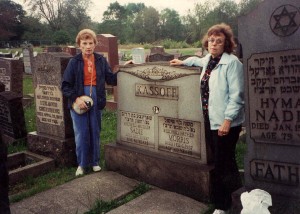 Julia (Zalk) Stratton (1920-2004), left, and her sister Celeste (Zalk) Kent (1926 – ) at their grandparents’ grave, 1997.
Julia (Zalk) Stratton (1920-2004), left, and her sister Celeste (Zalk) Kent (1926 – ) at their grandparents’ grave, 1997.
February 26, 2014 10 Comments
SEIGER’S RESTAURANT
The cops at the Sixth District police station in Cleveland considered me a hippie spy from the Heights. But when I told the cops I was a Seiger (“My uncle owned Seiger’s Restaurant on E.118th and Kinsman”), the cops warmed up to me. The cops — the older ones, the bosses — all knew Seiger’s Restaurant.
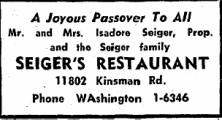
Cleveland Jewish News, 1968
Seiger’s Restaurant was a Damon Runyon casting hall on Kinsman Road. All manner of hustlers, cops, businessmen and shnorers (beggars) hung out there. The shnorers were Orthodox Jewish tzedakah (charity) collectors who had their own booth in the back.
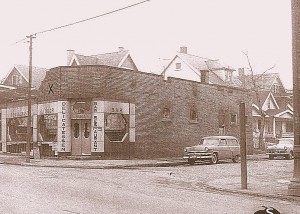
Seiger’s, 11802 Kinsman Rd., 1957
My Great Aunt Lil Seiger served the shnorers kosher food from her apartment, which was at the back of the store. The shnorers wouldn’t eat the non-kosher food from the restaurant. The deli was kosher-style, not kosher. “We served the rabonim [the rabbis] on special china and silverware, milchig [dairy]’,” Lil’s son Danny said.
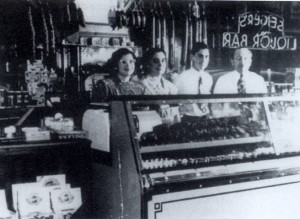
Seigers: Audrey (daughter), Lil, Danny (son) and Itchy, 1948
Rabonim — and cops — ate well at Seiger’s. Nobody ever got a ticket for an expired parking meter, and sometimes cars were parked two-lanes deep on Kinsman. “I couldn’t even spend a nickel in Seiger’s,” retired cop Bill Tofant said.
Itchy Seiger, my great uncle, was the owner and chief kibitzer (glad-handler/talker). He had been a cloak maker in Galicia, Austria-Hungary. Itchy was the greeter. Aunt Lil did the cooking, except the breads and strudels, which she bought.
There was a party room, seating about 65, in the basement. The matchbooks read: “Seiger’s Restaurant, Delicatessen, Barroom and Rathskeller.”
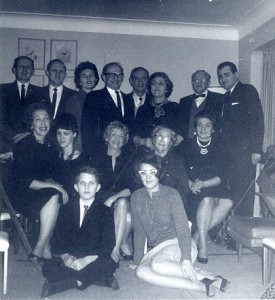
Danny and Itchy Seiger, back row, from R. Shiva for Anna Soltzberg, South Euclid, Ohio, 1964
I didn’t go to Seiger’s Restaurant often. My parents didn’t think Kinsman was the right direction for a Sunday drive. More often we wound up out east — the other direction — at the Metroparks.
Danny — my cousin — started showing up at Yiddishe Cup gigs in the 2000s. I asked him about the mini-feud between his father (my Uncle Itchy) and my grandmother, Anna Soltzberg (nee Seiger). Itchy and Anna had been half-siblings. (Enough with the genealogy, Klezmer Guy!) Danny said Itchy and Anna had had two things in common: sugar diabetes and iron wills.
My grandmother’s candy store — near Itchy’s deli on Kinsman — had frequently been “oyf tsoris” (badly off), and Itchy rescued it, Danny said.
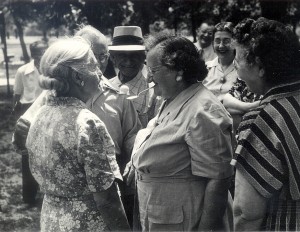
Anna Soltzberg, center, 1950s. Others unknown
“Everybody loved Itchy,” Danny said. Everybody but my grandmother, who complained about Itchy’s buy-out terms on her store. Later, my grandmother opened a candy store further east on Kinsman, near Shaker Heights.
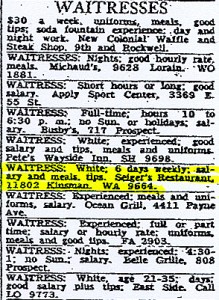
Cleveland Plain Dealer , 1947
“At the restaurant, there were two brothers, the Schoolers,” Danny said. “One, Joe, wanted a soft matzo ball. The other, Morty, wanted a matzo ball as hard as a baseball. Ma made both kinds. That’s how we thrived.”
Somebody should take Danny, age 80, and a video camera for a stroll down Kinsman. Walk Danny through the old neighborhood and into Seiger’s, which was recently a soul food restaurant. (Today it’s boarded up.)
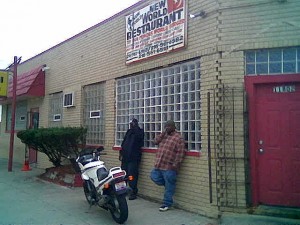
New World Restaurant, formerly Seiger’s, 2010.
The audio,
Danny: “This is where Ma made the mish-mash soup. She gave the recipe to Corky & Lenny’s. This is the counter where Jim Brown bounced a $10 check. I should have saved it for the autograph. This is where Oscar Schmaltz downed an industrial canister of soup. Oscar weighed 400.”
—
Footnote: Seiger’s is pronounced Sigh-ger’s (rhymes with High-gers) by Jews, and See-ger’s by cops. Seiger’s closed in 1968.
—
For relatives only . . . family photo above, taken at the shiva for Toby Stratton’s mother, Anna Soltzberg.
On floor, from L: Bert Stratton, sister Leslie.
Middle: Aunt Lil Soltzberg of Washington; Janice Bregman (wife of Marc Bregman); Aunt Pearl Bregman; Great Aunt Molly Mittman; Marcia Seiger.
Top: Uncle Milty Soltzberg, Toby Stratton, Julia Stratton, Uncle Sol Soltzberg, Great Uncle Sam Mittman, Aunt Lil Soltzberg of Delaware, Great Uncle Itchy Seiger, Danny Seiger.
(Sol Soltzberg, Milty Soltzberg, Pearl Bregman and Toby Stratton were siblings.) Marc Bregman — the son of Pearl Bregman — probably took this photo.
May 8, 2013 12 Comments




